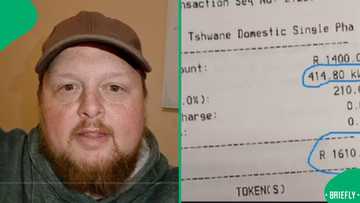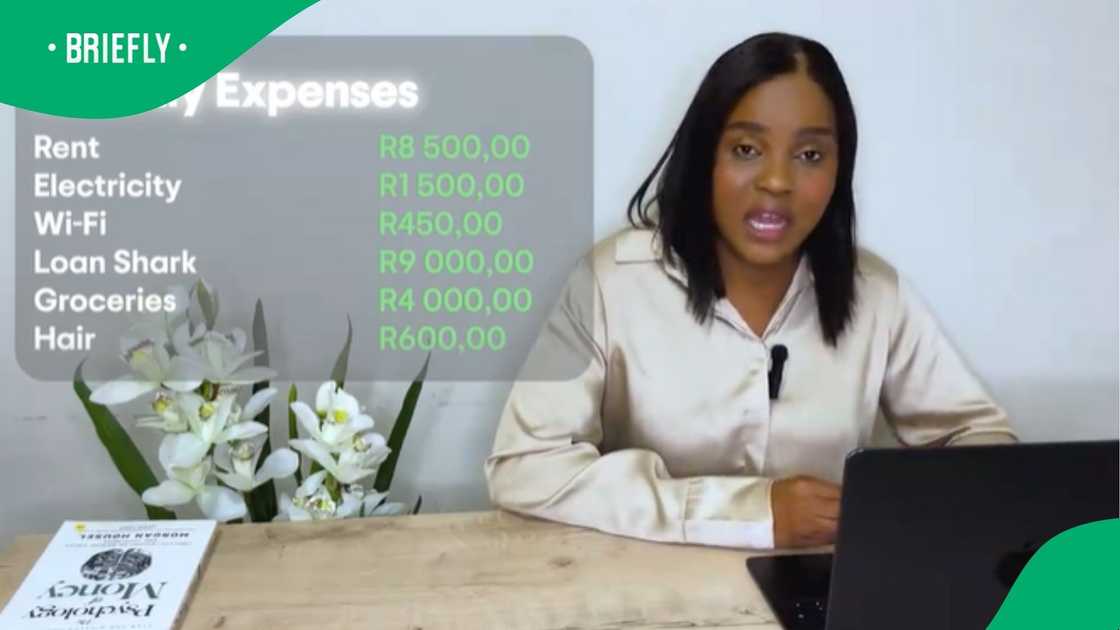Woman's Monthly Expenses on R16k Leave South Africans Stressed
- A TikTok video broke down how quickly a R16,000 salary disappears when compared to everyday expenses
- The figures, which included a hefty debt repayment, sparked anxiety, as many saw their financial struggles reflected
- The post comes at a time when rising costs and debt pressures are weighing heavily on South Africans
- Briefly News reached out to Lerato Zulu, a holistic finance coach, for her perspective on managing finances on a modest income
PAY ATTENTION: You can now search for all your favourite news and topics on Briefly News.
South Africans were left unsettled after a TikTok post highlighted how a seemingly decent monthly income can be swallowed by living costs and debt, exposing the harsh reality of today’s economy.

Source: TikTok
South Africans have been left shaken after a post by Phaswane Itumeleng Moloto, revealing how quickly a R16,000 monthly salary can be depleted by basic expenses. The video, which has garnered over 272 likes and numerous comments, sparked widespread concern. The salary being discussed does not belong to Itumeleng; she is reviewing it on behalf of someone who sent it to her to explore ways to save.

Read also
A woman’s TikTok showing her massive R5 savings pile went viral and received thousands of reactions in one day
In the clip, Moloto calmly goes through a list of monthly expenses that many South Africans would recognise all too well, including rent at R8,500, electricity at R1,500, Wi-Fi at R450, groceries at R4,000, hair at R600, and an eyebrow-raising R9,000 owed to a loan shark. When added together, the expenses far exceed the monthly income, leaving no room for savings or unexpected emergencies.
What resonated strongly with viewers was not just the individual costs, but how representative they are of life for many working South Africans. Rising rent prices, climbing food costs, and steep electricity tariffs have stretched households to their limit. Even those earning above the national average salary are finding it difficult to make ends meet.
PAY ATTENTION: Briefly News is now on YouTube! Check out our interviews on Briefly TV Life now!
Mzansi faces rising costs and debt pressures
The presence of a loan shark expense of R9,000 particularly struck a nerve. It highlighted how easily debt can spiral out of control when wages cannot cover essential living costs. With interest rates and the price of credit continuing to rise, many South Africans are turning to short-term lenders, often worsening their financial instability in the long run.

Read also
"Realtors need to start respecting us": South African calls out overpriced Bloemfontein rentals
Mzansi’s response online reflected a mix of stress, disbelief, and empathy. Many recognised themselves in the figures, noting how the economy has chipped away at purchasing power. For younger professionals in particular, the dream of financial independence is being replaced by a constant battle with debt and rising costs.
Lerato told Briefly News that many South Africans face the challenge of balancing essentials, lifestyle costs, and savings.
“Many South Africans earn around R16k or less and often feel stretched. A simple framework is the 50/30/20 principle: 50% for needs like housing, food, and transport, 30% for wants, and 20% for savings, debt repayment, and investing. In practice, given how stretched many are, it may look more like 70/20/10, but the goal is to consistently allocate some portion to savings, even if it’s small. Alternatively, the 10% can go toward debt payments to help clear over-indebtedness faster.”
Lerato highlighted the importance of prioritising essentials while trimming lifestyle expenses:

Read also
A TikTok video showed a massive crowd of job seekers, sparking debate about South Africa’s unemployment crisis
“Housing, food, transport, and insurance should always come first. Many people overspend on lifestyle costs like eating out, subscriptions, clothing, and impulse spending. Trimming these areas, even slightly, can free up cash flow. For example, meal planning and reducing takeaways can save hundreds monthly.”
She also provided advice on starting to save and invest, even with tight margins:
“The key is to start small and stay consistent. Even R200-R500 a month into a high-interest savings account or tax-free savings account builds momentum. Automating savings before spending makes it easier. For investing, low-cost ETFs allow beginners to start with very little. The mindset shift from ‘I’ll save when I earn more’ to ‘I’ll save something now’ is critical.”
Lerato emphasised that budgeting stress is not purely a personal finance issue but also reflects broader economic pressures:
“While personal finance habits play a role, this is largely a reflection of South Africa’s economic pressures, rising living costs, high unemployment, and stagnant wages. The middle class is being squeezed from both sides: supporting extended family while dealing with inflation and debt. So while individuals can make better money choices, systemic challenges mean budgeting stress is not just about poor planning but also about broader structural issues.”

Read also
"Our biggest enemies are Eskom and SARS": R1.6K for just 414 units of electricity has SA enraged

Source: TikTok
Mzansi reacted to the video
Zama said:
"How much is the salary? That loan shark amount alone is already stressing me. 😭"
SPUMs said:
"Wow, I have watched your blogs, but this one left me speechless. What if the mashonisa dies, where will the R9000 come from?"
Vene said:
"Is it 9k a month to mashonisa, or is the total outstanding debt to mashonisa 9k?"
Koketso Coco said:
"Today's case ea nstressa shem... Ke thomile ka go mo nyakela cheap rent, she must just go to Tembisa. And the kids must walk and bond. And her nails must rest for a month or six."
Anttonet_rahlagane said:
"Get an affordable place and take a loan to pay off that loan shark, so you can pay the bank a smaller amount monthly – and BLOCK THE LOAN SHARK!"
Sister M Budgets said:
"This is a big problem, hey. So lawyers, accountants, and doctors are poor because they sell a service? Woolies, Guess,and Gucci are poor because they sell products, considering they all started small. 🤔 I would have said, while they attend to a customer's hair, I would have told them to join me in selling The Perfume Co Africa perfumes. All the best, ITU."

Read also
A security guard’s TikTok showing her house under construction gained huge attention online
Stella Yolisa said:
"I watched the whole YT video and lomama makenze le bloody moer afuna uyenza, uphakeme ne salary encinci."
Moraks said:
"This case left me speechless. She has a problem with every solution you propose. 😭🥺"
Check out the TikTok video below:
3 Briefly News stories related to salaries
- A woman posted a TikTok video of the outing that she took her man on with her first salary after escaping unemployment.
- A South African woman used her very first salary as an education assistant to surprise her mother, making the moment extra special.
- A South African content creator who creates posts about budgeting went viral after she shared how she survives on her salary.
PAY ATTENTION: Follow Briefly News on Twitter and never miss the hottest topics! Find us at @brieflyza!
Source: Briefly News

